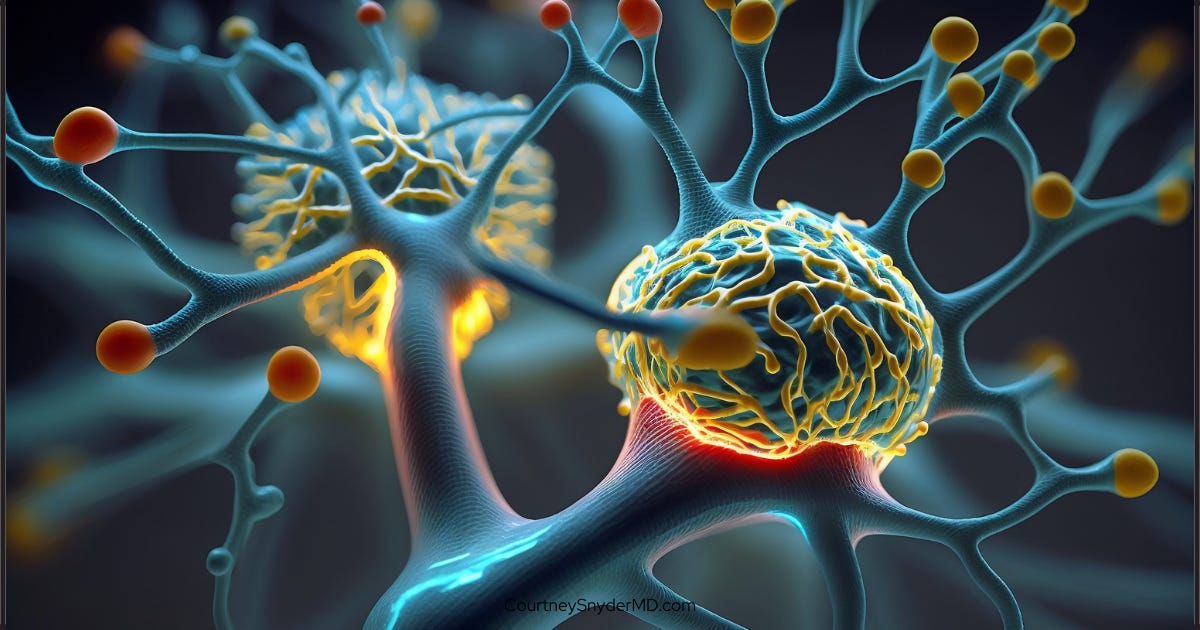Specific Nutrients That Increase & Decrease Neurotransmitter Activity
Case Example & the Four Ways Nutrients Affect the Communication Between Neurons
Recently I’ve seen a number of people with persistent high anxiety, restlessness, intrusive thoughts or delusions, insomnia, and pacing without improvement despite being on multiple psychiatric medications from their prescribing psychiatrist.
In such cases, it’s important to consider all the tools in the toolbox that might help calm things down while still moving forward with evaluating for underlying causes. Nutrients can be very powerful tools.
In this newsletter, after briefly reviewing the common neurotransmitters, I’ll address:
How nutrients increase or decrease neurotransmitters
How nutrients increase or decrease activity at receptors that neurotransmitters bind to
A specific example where targeted nutrients were used effectively to bring fairly rapid stabilization when medications were unable to. (I’m not opposed to meds when needed, nor would I suggest that they be avoided when symptoms are relatively severe)
First, let’s do a quick….
Neurotransmitter Review
The job of neurotransmitters is to facilitate communication between nerve cells. Here are the most common ones we think about in psychiatry.
Serotonin - joy, enjoyment, pleasure, interest, restful sleep
Low activity - depressed or anxious mood, lack of enjoyment, difficulty falling and staying asleep
Dopamine - pleasure and reward
Low activity - lack of motivation, difficulty starting and finishing tasks, low-stress tolerance, social isolation, helplessness and hopelessness
High activity - worry, insomnia, brain fog, paranoia, mania, psychosis
Norepinephrine - arousal
Low activity - can contribute to depression
High activity - can contribute to nervousness and insomnia
GABA - the major inhibitory neurotransmitter involved in calming and rest
Low activity - anxiety, high inner tension, and feelings of overwhelm
Glutamate - the major excitatory neurotransmitter in the brain, involved in learning, memory, and mood regulation. Excessive glutamate can cause over-excitation and cell death.
4 Ways Nutrients Impact Neurotransmitters:
1) Nutrients That Help Make Neurotransmitters
Vitamin B6 is needed to make serotonin, dopamine and GABA, which is why it is so commonly used in nutrient protocols that address brain symptoms.
L-Amino Acid Decarboxylase
5-Hydroxytyrptophan --------------------------------------> SEROTONIN
B6
L-Amino Acid Decarboxylase
L-DOPA -----------------------------------------------------> DOPAMINE
B6
L-Amino Acid Decarboxylase
GLUTAMIC ACID ---------------------------------------------> GABA
B6Copper is needed to turn dopamine into norepinephrine. With copper overload (a fairly common root cause of ADHD), there is low dopamine activity [think inattention], and increased norepinephrine [think hyperactivity and/or high anxiety].
Dopamine Beta-Hydroxylase
DOPAMINE ---------------------------------------------> NOREPINEPHRINE
Copper, Vitamin C, O2
2) Nutrients That Help Decrease Neurotransmitters
Keep reading with a 7-day free trial
Subscribe to Holistic Psychiatry to keep reading this post and get 7 days of free access to the full post archives.




